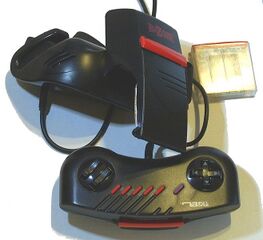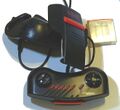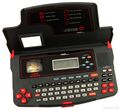Difference between revisions of "R-Zone"
From Sega Retro
m (Text replacement - "Category:Non-Sega consoles" to "{{NonSegaConsoles}}") |
|||
| (9 intermediate revisions by 3 users not shown) | |||
| Line 14: | Line 14: | ||
The R-Zone is the first of two very unsuccessful consoles developed by the company (the second being the [[Game.com]]). It was initially designed to capitalise on the "virtual reality" craze which had swept the US with [[Nintendo]]'s Virtual Boy (which also is considered a failure) and the unreleased [[Sega VR]]. | The R-Zone is the first of two very unsuccessful consoles developed by the company (the second being the [[Game.com]]). It was initially designed to capitalise on the "virtual reality" craze which had swept the US with [[Nintendo]]'s Virtual Boy (which also is considered a failure) and the unreleased [[Sega VR]]. | ||
| + | ==Hardware== | ||
The R-Zone is essentially an LCD handheld with the capability of playing multiple games. Cartridges have a built-in screen and contain all the information needed to play the game, while the R-Zone merely gives it power, allows sound to be played and lets the user take control. Rather than rely on the greys of normal LCD displays, a red light is shone through to add contrast, and the screen is then mirrored so the user can see more clearly. | The R-Zone is essentially an LCD handheld with the capability of playing multiple games. Cartridges have a built-in screen and contain all the information needed to play the game, while the R-Zone merely gives it power, allows sound to be played and lets the user take control. Rather than rely on the greys of normal LCD displays, a red light is shone through to add contrast, and the screen is then mirrored so the user can see more clearly. | ||
| Line 23: | Line 24: | ||
Due to Tiger's relationship with companies such as [[Sega]], many popular intellectual properties were brought to the system in an attempt to woo consumers. However the multitude of limitations which plagued the console meant that many were left disappointed. By 1998 the handheld had been discontinued, though more "experimental" versions of the hardware disappeared during 1997. | Due to Tiger's relationship with companies such as [[Sega]], many popular intellectual properties were brought to the system in an attempt to woo consumers. However the multitude of limitations which plagued the console meant that many were left disappointed. By 1998 the handheld had been discontinued, though more "experimental" versions of the hardware disappeared during 1997. | ||
| + | |||
| + | The system is widely considered to be the worst video game console of all time, due to the red-and-black graphics and offering not much improvement over the Tiger LCD games. | ||
==Sega Games Released for the R-Zone== | ==Sega Games Released for the R-Zone== | ||
| Line 28: | Line 31: | ||
*''[[Indy 500 (R-Zone)|Indy 500]]'' (1995) | *''[[Indy 500 (R-Zone)|Indy 500]]'' (1995) | ||
*''[[Daytona USA (R-Zone)|Daytona USA]]'' (199x) | *''[[Daytona USA (R-Zone)|Daytona USA]]'' (199x) | ||
| − | *''[[NiGHTS into Dreams]]'' (199x) | + | *''[[NiGHTS into Dreams (R-Zone)|NiGHTS into Dreams]]'' (199x) |
| − | *''[[Panzer Dragoon]]'' (199x) | + | *''[[Panzer Dragoon (R-Zone)|Panzer Dragoon]]'' (199x) |
*''[[Virtua Cop (R-Zone)|Virtua Cop]]'' (199x) | *''[[Virtua Cop (R-Zone)|Virtua Cop]]'' (199x) | ||
*''[[Virtua Fighter (R-Zone)|Virtua Fighter]]'' (199x) | *''[[Virtua Fighter (R-Zone)|Virtua Fighter]]'' (199x) | ||
| Line 41: | Line 44: | ||
</gallery> | </gallery> | ||
| − | + | ==Releases== | |
| + | {{MultiReleaseTable| | ||
| + | {{MultiReleaseRow | ||
| + | | front=DaytonaUSA RZone US Box Front.jpg | ||
| + | |||
| + | | code= | ||
| + | | name=''Daytona USA'' | ||
| + | | date= | ||
| + | | price= | ||
| + | | region=US | ||
| + | }} | ||
| + | {{MultiReleaseRow | ||
| + | | front=Indy500 RZone US Box Front.jpg | ||
| + | |||
| + | | code= | ||
| + | | name=''Indy 500'' | ||
| + | | date= | ||
| + | | price= | ||
| + | | region=US | ||
| + | }} | ||
| + | {{MultiReleaseRow | ||
| + | | front=NiGHTS RZone US Box Front.jpg | ||
| + | | back=NiGHTS RZone US Box Back.jpg | ||
| + | | code= | ||
| + | | name=''NiGHTS into Dreams'' | ||
| + | | date=1997 | ||
| + | | price= | ||
| + | | region=US | ||
| + | }} | ||
| + | {{MultiReleaseRow | ||
| + | | front=PanzerDragoon RZone US Box Front.jpg | ||
| + | | code= | ||
| + | | name=''Panzer Dragoon'' | ||
| + | | date= | ||
| + | | price= | ||
| + | | region=US | ||
| + | }} | ||
| + | {{MultiReleaseRow | ||
| + | | front=PanzerDragoon RZone EU Box Front.jpg | ||
| + | | back=PanzerDragoon RZone EU Box Back.jpg | ||
| + | | code= | ||
| + | | name=''Panzer Dragoon'' | ||
| + | | date= | ||
| + | | price= | ||
| + | | region=EU | ||
| + | }} | ||
| + | {{MultiReleaseRow | ||
| + | | front=VirtuaCop2 RZone US Box Front.jpg | ||
| + | | code= | ||
| + | | name=''Virtua Cop'' | ||
| + | | date= | ||
| + | | price= | ||
| + | | region=US | ||
| + | }} | ||
| + | {{MultiReleaseRow | ||
| + | | front=VirtuaFighter2 RZone US Box Front.jpg | ||
| + | | code= | ||
| + | | name=''Virtua Fighter 2'' | ||
| + | | date= | ||
| + | | price= | ||
| + | | region=US | ||
| + | | image1=VirtuaFighter2 RZone US Cart.jpg | ||
| + | }} | ||
| + | }} | ||
| + | |||
| + | ==References== | ||
| + | <references /> | ||
| + | |||
| + | {{NonSegaConsoles}} | ||
Latest revision as of 14:35, 2 October 2020

|
| R-Zone |
|---|
| Manufacturer: Tiger Electronics |
This teeny-tiny article needs some work. You can help us by expanding it.
The R-Zone is a handheld video game console, released by Tiger Electronics in 1995. It was Tiger's first foray into cartridge-based consoles - until this point the company were notable for dedicated LCD systems.
The R-Zone is the first of two very unsuccessful consoles developed by the company (the second being the Game.com). It was initially designed to capitalise on the "virtual reality" craze which had swept the US with Nintendo's Virtual Boy (which also is considered a failure) and the unreleased Sega VR.
Hardware
The R-Zone is essentially an LCD handheld with the capability of playing multiple games. Cartridges have a built-in screen and contain all the information needed to play the game, while the R-Zone merely gives it power, allows sound to be played and lets the user take control. Rather than rely on the greys of normal LCD displays, a red light is shone through to add contrast, and the screen is then mirrored so the user can see more clearly.
Four different R-Zones exist:
- The R-Zone Headgear: a large contraptiom which attaches to the user's head
- The R-Zone Super Screen: a stand-alone unit with a larger screen
- X.P.G.: Xtreme Pocket Game: a portable unit more akin to rival consoles
- The R-Zone Data Zone: an R-Zone paired with a data organiser
Due to Tiger's relationship with companies such as Sega, many popular intellectual properties were brought to the system in an attempt to woo consumers. However the multitude of limitations which plagued the console meant that many were left disappointed. By 1998 the handheld had been discontinued, though more "experimental" versions of the hardware disappeared during 1997.
The system is widely considered to be the worst video game console of all time, due to the red-and-black graphics and offering not much improvement over the Tiger LCD games.
Sega Games Released for the R-Zone
At least six Sega games are known to have been released on the R-Zone, including Indy 500 which acted as a launch title.
- Indy 500 (1995)
- Daytona USA (199x)
- NiGHTS into Dreams (199x)
- Panzer Dragoon (199x)
- Virtua Cop (199x)
- Virtua Fighter (199x)
Gallery
Releases
| Code | Name | Box scans | Images | Region | Date | Price | Documentation | Description |
|---|---|---|---|---|---|---|---|---|
| Daytona USA | US | |||||||
| Indy 500 | US | |||||||
| NiGHTS into Dreams | US | 1997 | ||||||
| Panzer Dragoon | US | |||||||
| Panzer Dragoon | EU | |||||||
| Virtua Cop | US | |||||||
| Virtua Fighter 2 | US |
References
| Non-Sega consoles |
|---|
| Nintendo |
| Nintendo Entertainment System (1983) | Game Boy (1989) | Super Nintendo Entertainment System (1990) | Nintendo 64 (1996) | Game Boy Color (1998) | Game Boy Advance (2001) | Nintendo GameCube (2001) | Nintendo DS (2004) | Wii (2006) | Nintendo 3DS (2011) | Wii U (2012) | Nintendo Switch (2017) |
| Sony |
| PlayStation (1994) | PlayStation 2 (2000) | PlayStation Portable (2004) | PlayStation 3 (2006) | PlayStation Vita (2011) | PlayStation 4 (2013) | PlayStation 5 (2020) |
| Microsoft |
| Xbox (2001) | Xbox 360 (2005) | Xbox One (2013) | Xbox Series X (2020) |
| Mobile |
| iOS | Android | Windows Phone |
| Other |
| Atari 2600 (1977) | ColecoVision (1982) | PC Engine (1987) | R-Zone (1995) | Game.com (1997) | WonderSwan (1998) | Neo Geo Pocket Color (1999) | N-Gage (2003) | LeapFrog Didj (2008) | Stadia (2019) |












